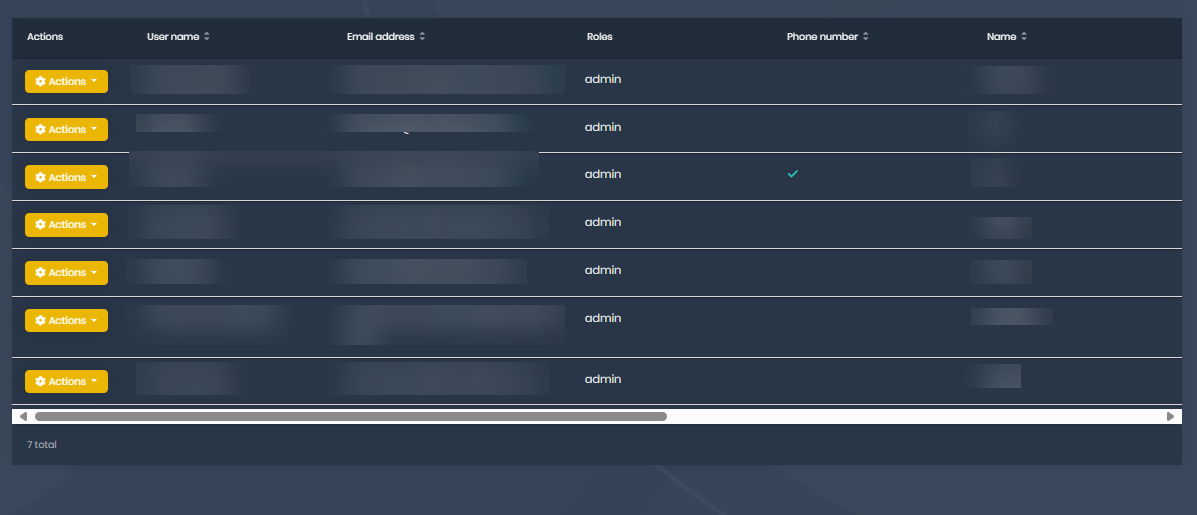Thanks, we're good. Have a nice day :)
I've fixed the issue now.
We had a this in the styles array in angular.json:
"node_modules/@yaireo/tagify/dist/tagify.css",
after lepton4.css but before the ngx-datable one's.
Moving it to the end, it worked
Thanks, I have created a new thread. https://abp.io/support/questions/9848/stylecss-loaded-in-wrong-order
Sorry bot, but I need a human.
Also, styles.scss is the last entry in the styles array.
We are using the Lepton Theme (non-X) and after upgrading to ABP 9.3.2 (from 9.2.x) we face some styling issues. We think the issue might be related to the order in which our styles are loaded.
This seems similar to https://abp.io/support/questions/9821/Angular-Style-Declaration-Order-is-ignored-when-injecting-styles-into-the-DOM-since-upgrade-to-ABP-931, but this was for LeptonX.
Our app in production (9.2.x):
<link rel="stylesheet" href="lepton4-X4OK76EB.css">
<link rel="stylesheet" href="ngx-datatable-index-ALC7J2LN.css">
<link rel="stylesheet" href="ngx-datatable-icons-YZZVGCGU.css">
<link rel="stylesheet" href="ngx-datatable-material-QROZ42NV.css">
<link rel="stylesheet" href="fontawesome-all.min-V43YH5Q7.css">
<link rel="stylesheet" href="fontawesome-v4-shims.min-5GHJGPBV.css">
<link rel="stylesheet" href="styles-3O3IHLFY.css">
Our development app (same app, but upgraded to 9.3.2):
<link rel="stylesheet" href="lepton4.css">
<link rel="stylesheet" href="styles.css">
<link rel="stylesheet" href="ngx-datatable-index.css">
<link rel="stylesheet" href="ngx-datatable-icons.css">
<link rel="stylesheet" href="ngx-datatable-material.css">
<link rel="stylesheet" href="fontawesome-all.min.css">
<link rel="stylesheet" href="fontawesome-v4-shims.min.css">
We are facing issues with the ngx-datatable not being styled correctly.
Here's our app in production, styled to full page height:

Here's the App in development, not styled to full height:

It also exhibits other style issues, but only in the ngx-datatable:

Which seems to suggest to us that the loading of the styles is the issue, as we correctly override things in the lepton4.css from the base theme, but certain ngx-datatable stuff does not get overridden correctly, as the style.css is loaded before the ngx-datatable.css stuff.
Ours looks like this:
<link rel="stylesheet" href="lepton4.css">
<link rel="stylesheet" href="styles.css">
<link rel="stylesheet" href="ngx-datatable-index.css">
<link rel="stylesheet" href="ngx-datatable-icons.css">
<link rel="stylesheet" href="ngx-datatable-material.css">
<link rel="stylesheet" href="fontawesome-all.min.css">
<link rel="stylesheet" href="fontawesome-v4-shims.min.css">
And in production (with ABP 9.2) we have:
<link rel="stylesheet" href="lepton4-X4OK76EB.css">
<link rel="stylesheet" href="ngx-datatable-index-ALC7J2LN.css">
<link rel="stylesheet" href="ngx-datatable-icons-YZZVGCGU.css">
<link rel="stylesheet" href="ngx-datatable-material-QROZ42NV.css">
<link rel="stylesheet" href="fontawesome-all.min-V43YH5Q7.css">
<link rel="stylesheet" href="fontawesome-v4-shims.min-5GHJGPBV.css">
<link rel="stylesheet" href="styles-3O3IHLFY.css">
We have the same issue I think on the Lepton (non-X) theme... How would we resolve that?
Thanks. After tinkering a few more with it I found the issue...
I wanted to replace the MinioBlobProvider with our own, but we had replaced IBlobProvider instead of the MinioBlobProvider 🤦
After fixing that, it works again now. Thx :)
Oh, and the exception happens when we e.g. go to the Tenant list in the Host, or to Audit logs
[maliming] said: hi
Can you share the steps or project that I can reproduce this exception?
liming.ma@volosoft.com
Thanks.
The steps are to add minio as a BLOB provider and configure it for a container. Can't share the project unfortunately as it's our entire product

